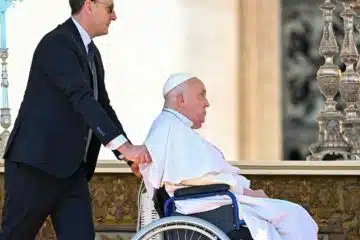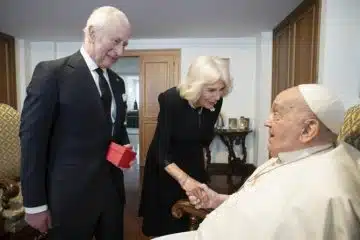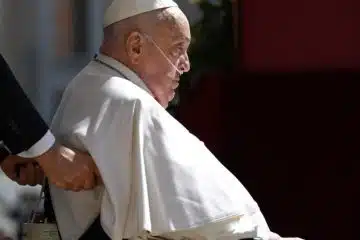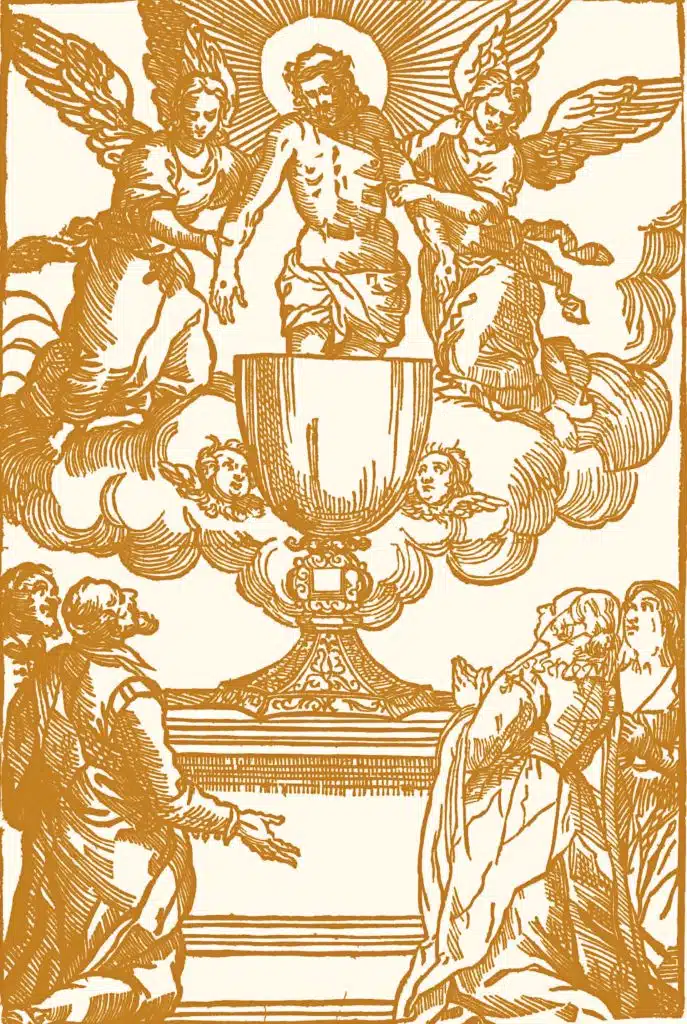The Two Become One Flesh

Soon-to-be Saint Carlo Acutis wrote, “The more often we receive the Eucharist, the more we become like Jesus and the more we get a foretaste of Heaven.” As Catholics we often forget that Holy Communion is not merely one of the many rituals of the Mass: it is the moment we have been waiting for. When Mass begins, we start at the foot of Calvary’s hill, confessing our sinfulness and our need for a savior. From there, we make our way to the top of the hill to receive what Vatican II called “the source and summit of the whole Christian life,” the gift Jesus makes of Himself upon the Cross: the gift promised at the Last Supper when He said, “This is my Body … given up for you … This is my Blood … poured out for many” (Mt. 26:26-30)
We come to Mass not only to pray, worship and give thanks, but to enter into Holy Communion with Jesus Christ Himself, to participate in the mystery of Jesus the Bridegroom and His Bride, the Church, where in Holy Communion the two become one. We cannot approach this heavenly moment casually; we must come prepared, having examined ourselves and our relationship with Him: are we one with Him in heart and soul as we soon will be in sacrament?
Abstaining
If we have turned away from Him in mortal sin, we must abstain from Communion. As St. Paul reminds the Corinthians, “For anyone who eats and drinks without discerning the body, eats and drinks judgment on himself” (1 Cor. 11:34). How can we enter into Communion with Jesus if, in our sin, we have rejected Him? Consider a friendship and the effect a betrayal or an act of violence can have on the intimacy one shares; if this is true of our human friends, how much more so Jesus? Holy Communion is unity with Jesus—hence “communion”—and if mortal sin breaks our bond with Him, we must reconcile with God before we receive Holy Communion again. As part of our preparation for Mass, we must take the time to examine our hearts and souls: Am I ready to be one with Jesus in Holy Communion today?
Fasting
We further prepare for Holy Communion by fasting for one hour prior to receiving the Eucharist. Fasting is a holy activity practiced even by Our Lord. It helps prepare us to receive this special and holy Food: the Body and Blood of Jesus Christ. We begin to prepare our hearts and minds for this sacred time, as well as prepare our bodies, witnessing by this simple act the truth that “Man does not live by bread alone” (Deuteronomy 8:3). This little fast allows us to turn away from the things of this world to instead turn body and soul toward the Lord who says, “I am the bread of life; whoever comes to me will never hunger, and whoever believes in me will never thirst” (Jn. 6:35).
Receiving
Having prepared for Holy Communion in our hearts and our bodies, when the time comes, how ought we receive Him? The Church allows us to receive in the hand or upon the tongue, whichever the communicant prefers. When receiving in the hand, do not take the Host from the minister; let the minister give the Host to you. The Eucharist is a gift we receive, not something we are owed or may take. Do we not pray shortly before Holy Communion the humble prayer of the Centurion, “Lord, I am not worthy that you should enter under my roof” (Mt. 8:8)?
This is why we receive in a humble manner, like children being fed or as beggars with hands outstretched. However we choose to receive, we must do so with all humility and care, for as St. Thérèse of Lisieux wrote in her autobiography: “Our Lord does not come from Heaven every day to stay in a golden ciborium; He comes to find another heaven, the heaven of our soul in which He loves to dwell.”
How blessed are we that Jesus, so eager to enjoy communion with us in the life to come, has gone through such extraordinary means to make that communion possible in this life, while we are yet in the midst of our struggle with sin. During this time of Eucharistic Renewal, let us all renew our efforts to deepen our gratitude for this gift, and to do what we can to approach Holy Communion with the care, reverence and love He deserves, because—upon the Cross and again in the Sacrament—He showed us such care, reverence and love first (1 Jn. 4:19).
This article appeared in the April 2025 edition of The Catholic Telegraph Magazine. For your complimentary subscription, click here.














